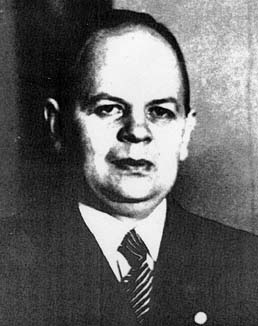Wilhelm Ackermann (nonfiction): Difference between revisions
No edit summary |
No edit summary |
||
| Line 1: | Line 1: | ||
[[File:Wilhelm Ackermann.jpg|thumb|Wilhelm Friedrich Ackermann circa 1935.]]'''Wilhelm Friedrich Ackermann''' (29 March 1896 – 24 December 1962) was a German [[Mathematician (nonfiction)|mathematician]] best known for the Ackermann function, an important example in the theory of computation. | [[File:Wilhelm Ackermann.jpg|thumb|Wilhelm Friedrich Ackermann circa 1935.]]'''Wilhelm Friedrich Ackermann''' (29 March 1896 – 24 December 1962) was a German [[Mathematician (nonfiction)|mathematician]] best known for the Ackermann function, an important example in the [[Theory of computation (nonfiction)|theory of computation]]. | ||
Ackermann was born in Herscheid municipality, Germany, and was awarded a Ph.D. by the University of Göttingen in 1925 for his thesis ''Begründung des "tertium non datur" mittels der Hilbertschen Theorie der Widerspruchsfreiheit'', which was a consistency proof of arithmetic apparently without full Peano induction (although it did use e.g. induction over the length of proofs). | Ackermann was born in Herscheid municipality, Germany, and was awarded a Ph.D. by the University of Göttingen in 1925 for his thesis ''Begründung des "tertium non datur" mittels der Hilbertschen Theorie der Widerspruchsfreiheit'', which was a consistency proof of arithmetic apparently without full Peano induction (although it did use e.g. induction over the length of proofs). | ||
| Line 26: | Line 26: | ||
* [[David Hilbert (nonfiction)]] | * [[David Hilbert (nonfiction)]] | ||
* [[Mathematician (nonfiction)]] | * [[Mathematician (nonfiction)]] | ||
* [[Theory of computation (nonfiction)]] | |||
External links: | External links: | ||
Latest revision as of 14:30, 15 November 2017
Wilhelm Friedrich Ackermann (29 March 1896 – 24 December 1962) was a German mathematician best known for the Ackermann function, an important example in the theory of computation.
Ackermann was born in Herscheid municipality, Germany, and was awarded a Ph.D. by the University of Göttingen in 1925 for his thesis Begründung des "tertium non datur" mittels der Hilbertschen Theorie der Widerspruchsfreiheit, which was a consistency proof of arithmetic apparently without full Peano induction (although it did use e.g. induction over the length of proofs).
From 1929 until 1948, he taught at the Arnoldinum Gymnasium in Burgsteinfurt, and then at Lüdenscheid until 1961. He was also a corresponding member of the Akademie der Wissenschaften (Academy of Sciences) in Göttingen, and was an honorary professor at the University of Münster.
In 1928, Ackermann helped David Hilbert turn his 1917 – 22 lectures on introductory mathematical logic into a text, Principles of Mathematical Logic. This text contained the first exposition ever of first-order logic, and posed the problem of its completeness and decidability (Entscheidungsproblem).
Ackermann went on to construct consistency proofs for set theory (1937), full arithmetic (1940), type-free logic (1952), and a new axiomatization of set theory (1956).
Although Ackermann did not choose a university career and rather continued as a high school teacher, he was continually engaged in research and published many contributions to the foundations of mathematics until the end of his life.
He died in Lüdenscheid, Germany.
In the News
Fiction cross-reference
Nonfiction cross-reference
External links:
- Wilhelm Ackermann @ Wikipedia
Attribution:
